-
Implementing Green Business Practices
Whether you run a restaurant, an office, or some other kind of business, there are practices that you can put into place to make your business greener. By finding ways to cut back on the waste that you create and recycling whenever you can, you can reduce your company’s carbon footprint and help the world take steps towards a better tomorrow. Stop filling your dumpsters in Atlanta with garbage, and learn more about implementing green business practices that will help the environment. Check out several of the easiest ways to do it below.
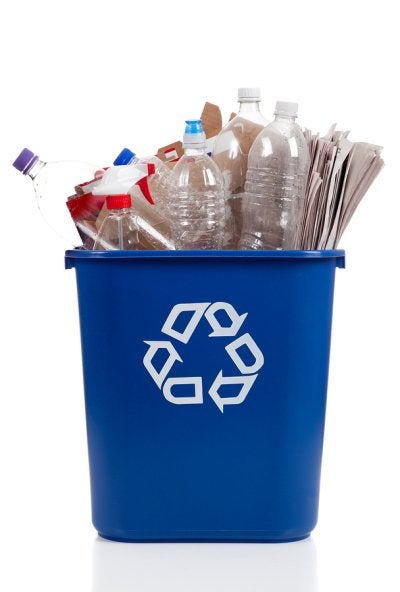
Use Less Paper
You probably don’t realize it, but the majority of what lands in your company’s dumpsters is either paper or paper products. From pieces of paper that you don’t need anymore to paper cups and paper plates, businesses use a lot of paper. Studies suggest that paper makes up about 35 percent of all waste created by commercial companies . You can put a stop to this by finding ways to use less paper. From relying on electronic documents to encouraging your employees to use coffee mugs and reusable water bottles, you can reduce the amount of paper you use.
Put Out Recycling Bins
At this point, most people know that they are supposed to recycle products made out of plastic, metal, and even paper. But if you don’t provide them with recycling bins that are clearly labeled, how are they supposed to know where to put recyclable items? You should have recycling bins throughout your commercial property to encourage both your employees and customers to recycle more often. Recycling will keep much of your company’s waste out of landfills and allow for your discarded items to be reused in the future.
Think About How You’re Using Energy
There are plenty of ways to cut back on your company’s energy consumption. From investing in LED light bulbs that are more efficient than other light bulbs to unplugging computers and electronics at the end of every business day, you can reduce the energy your company uses and make your business greener as a result of it.
-
Tips for Recycling At Home
When you reduce, reuse, and recycle in Atlanta , you can be proud to be doing your part to reduce global warming, decrease greenhouse gas emissions, and protect the environment. Recycling at home is easy, and you can consult with your local recycling center for recycling facts and tips. Your recycling center should provide you with enough recycling bins to handle your weekly recycling, and you should be aware of your recycling and trash pickup location, date, and time.
Before placing materials in recycling bins, be aware of what materials are recyclable. Most recycling centers can recycle plastic, wood, glass, metal, cardboard, and paper. Electronics, appliances, batteries, and hazardous household waste may have a regularly scheduled pick up location and date that differs from your standard weekly recycling. You should also educate yourself on how to reduce or reuse certain common household waste items.
For instance, many food items can be composted and used to fertilize plants, flowers, and trees. Animal shelters, homeless shelters, and other charitable organizations can reuse clothing, towels, and bedding. If you’re unsure which materials can be reduced, reused, and recycled, you can contact your local recycling center or waste management company.
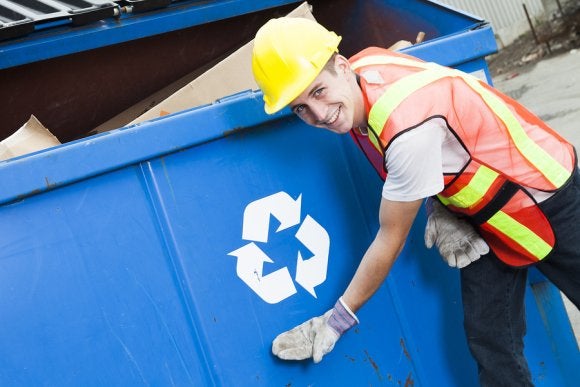
-
Recycling in Your Office
If you’re interested in implementing a recycling program in your office, you should look up recycling facts about paper and cardboard recycling in Atlanta . Most offices generate a huge amount of paper and cardboard waste. You can reduce your waste by being more aware of your waste production practices and how to substitute products that are reusable or recyclable.
Watch this video for some more recycling facts and tips about recycling in the office. You and your fellow employees can commit to reduce, reuse, and recycle office waste whenever possible. This will lower the company’s waste disposal and waste management costs, and make the office a more productive and comfortable environment for everyone.
-
Our Industrial Waste Management Services
At Southern Waste and Recycling, we provide comprehensive and sustainable industrial waste management in Atlanta . Our industrial waste management services include on-site waste collection via roll off dumpster rentals, recycling services, waste analytics, and waste reduction and recycling facts and tips. We’re committed to helping industrial facilities reduce, reuse, and recycle in order to decrease their waste disposal costs and limit their environmental impacts.
Industrial facilities are one of the largest producers of waste in the country. By working with an experienced waste management company, you can learn how to significantly reduce your waste. We will use waste analytics data to evaluate which departments and processes generate the most waste. We’ll then work closely with you to develop specialized, structured programs for sustainable waste management. We will teach you how to recycle appropriate materials and reduce or reuse non-recyclable materials.
We’ll also help you implement a recycling program in your facility. This includes distributing recycling facts and educating everyone in the facility. Recycling bins, dumpsters, balers, and compactors should be strategically placed in visible and easy to access areas. When everyone knows how to reduce, reuse, and recycle, your waste disposal costs will significantly decrease.

-
The Metal Recycling Process
Metals are used in manufacturing and production across a wide range of industries. When you are planning a waste management project for your home or business, you should be sure to implement metal recycling into your program. From scrap metal recycling to construction recycling and more, there are many ways that metals are recycled and reused. A company that specializes in waste management and recycling serving Atlanta will be able to provide you with more information about the fantastic benefits of metal recycling. To help you get started on your recycling program, here is a look at the process of metal recycling.
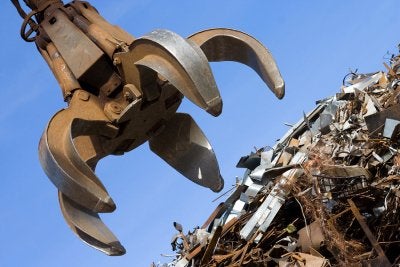
Collection
Collection is the first step of the metal recycling process . During the collection process, metals are obtained and placed into specialized containers. To make sure that your metals are in good shape once they reach the recycling center, it is a good idea to use recycling bins that have been designed specifically for use with different kinds of metals. Once you have collected your metals, you will be ready to visit your local recycling center.
Sorting
The sorting process involves the separation of metals into recyclable and non-recyclable categories. Typically, sorting will happen directly at the recycling facility. Your recycling specialist will determine what metals can be recycled, and which are not eligible for the recycling process. The metal materials may also be divided into ferrous and non-ferrous categories. With all of the metal recyclables sorted and categorized, it will be time to move to the final step of the metal recycling process.
Shredding and Purification
After sorting, metal recyclables are sent to a machine that is known as a shredder. The shredder will break down the sheets and pieces of metal and turn even the largest pieces of metal into manageable components. Next, the metal pieces are purified and melted under very intense heat. Once the metal has been completely melted, it will be ready for use in the manufacturing and production industries.
-
A Closer Look at How Metal Recycling Works
While all recycling serving Atlanta aims to protect the environment by keeping reusable materials out of landfills, not all materials are recycled the same way. When it comes to metal recycling, the steps might even vary between different types of metals. Between aluminum, scrap and precious metals, and steel, metal recycling works in a range of different ways. Feel free to continue on if you would like a closer look at how metal recycling works.
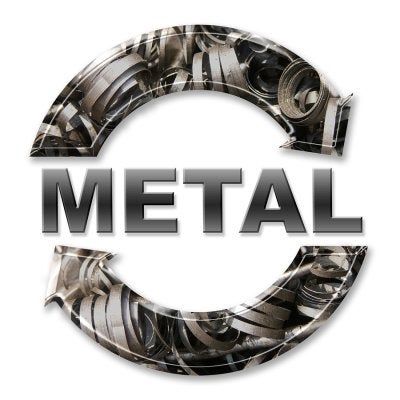
Soda Cans and Other Aluminum
Metal retains its durability each time it is melted down, making it a great candidate for recycling. While there are many different types of metals, aluminum is among the most popular when it comes to recycled products. A metal can might even be recycled into a new can in less than two months . Soda and beer are both popular products in the United States; these products make their way off the shelves almost as soon as they are stocked. This contributes to a great deal of aluminum waste, which many households have done an excellent job of recycling in the past. Families often set aside a specific recycling bin for aluminum cans. They then take this bin to the curb on recycling day so that their cans can be retrieved and recycled.
Scrap and Precious Metals
While an aluminum can may be your prototypical idea of a recyclable product, there are other metal products that can be even more valuable to recycle. Many homeowners who throw out old appliances do not realize that they can actually make money off of these broken machines. This process is not unlike selling a car for parts. Precious metals like gold and silver can also be melted down and reused, and you can fetch a pretty penny in doing so.
Steel Recycling
One of the many benefits of recycling is the ability to create a new product without expending as much energy. This is particularly apparent in the case of steel recycling. You might bring your used steel to a collection center, a supermarket, or simply to the end of your driveway.
-
The Recycling Process
Recycling serving Atlanta has become a cornerstone of the green movement, and it helps keep tons and tons of usable materials in circulation. While you know the truck that comes for trash pickup will bring your garbage to a landfill, you can rest assured that the products in your recycling bins may see the light of day again. Watch this video for a quick overview of the recycling process.
Once you have used a product or finished a meal, you are then faced with the decision of what to do with the remains. The contents of your garbage can will end up in a landfill, but the contents of your recycling bins might end up back on shelves as new products. This helps to save energy, free up space in landfills, and stimulate the economy. If you can find a new purpose for your used materials, you can also reuse them yourself.
-
Looking Back at the History of Recycling
Like many other aspects of modern society, recycling serving Atlanta has been around in some form for many generations. However, recycling of old differed from today’s processes, and it occurred for different reasons. The industrial boom changed the way we manufacture, sell, and purchase products, which had its own impact on recycling, and environmental consciousness has propelled the green movement in more recent years. Read on if you are interested in looking back at the history of recycling.
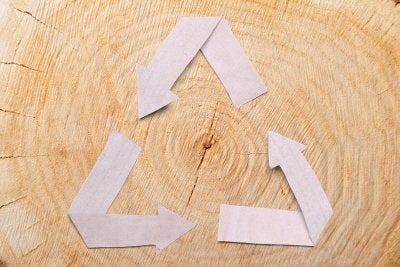
Recycling by Necessity
Though it may be difficult to picture now, there was a time when products were primarily made by hand. When this was the case, it made the most sense to reuse what you had because it required less energy than creating a new product; this is still a primary benefit of recycling today. The 1930s and 40s saw economic depression that affected a substantial amount of the population. Many families were not able to afford the goods that they needed, so they were forced to recycle their products in order to survive. During the same time, certain materials were rationed for the war. After World War II, however, the societal landscape had changed.
Industrial Boom and Disposability
The United States enjoyed prosperity and a new way of life after the Second World War, and with it came a sense of disposability. The latter half of the 40s and the entirety of the 50s saw a cheap production of goods, which meant that families were able to afford what they needed. Unfortunately this meant that they cared little for what they did not need, and were inclined to throw their used products in the trash. Fortunately society began to regain their environmental consciousness over the course of the following years.
Environmental Consciousness
The 60s and 70s managed to revive society’s appreciation for the planet and the environment. Since the first Earth Day was celebrated in 1970 , the prospect of recycling has gradually picked up traction. It still has a long way to go in terms of total sustainability, but many tons of used products are now recycled regularly.
-
Guidelines for Operating an Industrial Waste Management System
There are very specific guidelines that govern anyone involved with industrial waste production or waste disposal in Atlanta . Industrial processes typically produce solid waste, hazardous waste, and mixed waste. Here are the waste disposal methods that industrial manufacturers must adhere to in order to operate a lawful, efficient, and comprehensive waste management system.
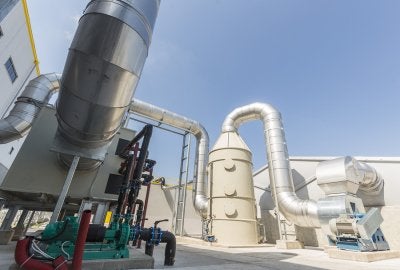
Solid Waste Disposal
Solid waste is non-hazardous, non-household waste that is generated during industrial manufacturing processes. Industrial solid waste management requires that the waste be evaluated, either by laboratory testing or documenting its characteristic, to determine whether or not it is hazardous. Common forms of industrial solid waste include empty containers, building materials, paint residue, sludge, tires, food waste, animal remains, and glass and plastic that can’t be recycled. Your local waste management company can perform waste disposal for all non-hazardous materials and waste.
Hazardous Waste Disposal and Recycling
Hazardous waste is any waste that is harmful to human health or the environment. This waste may be in liquid, solid, gas, or sludge form, and may include discarded industrial products or by-products. Hazardous industrial waste must often be stabilized and/or solidified prior to waste disposal. Hazardous waste disposal methods may include incineration, destruction, recycling, and isolation in landfills. Hazardous waste recycling involves reusing or reclaiming hazardous industrial waste. Waste is reclaimed when it is processed to recover a reusable product, or if it is regenerated. Some hazardous waste, like lead-acid batteries or electronic circuit boars, can be recycled into new products
Mixed Waste Disposal
Mixed waste consists of both radioactive and hazardous materials or components. The Resource Conservation and Recovery Act and the Atomic Energy Act regulate mixed waste disposal, and the U.S. Nuclear Regulatory Commission and the U.S. Department of Energy regulate radioactive waste disposal. Most industrial mixed waste is categorized as low-level mixed waste. Mixed waste management and waste disposal is significantly more expensive than radioactive waste; however, a waste generator can reduce the volume of mixed waste that is produced by industrial processes.
-
Spotlight on Industrial Waste Considerations
Factories, warehouses, and automotive centers are responsible for the majority of industrial waste in Atlanta . In order to maintain the safety, cleanliness, and efficiency of an industrial building, it’s crucial to have a comprehensive waste management program. A comprehensive waste management program consists of reducing waste production and waste disposal costs, reusing or donating reusable materials, and implementing a strong recycling program.
Your waste management company should provide you with dumpsters and recycling bins that are large enough to meet your needs. Make sure that these are strategically placed so that they are easily accessed by employees, yet won’t impede efficiency or safety. Your waste management company should also provide you with statistical information about the volume and type of waste you produce, so that you can efficiently and effectively schedule waste disposal, trash pickup, and recycling services.
Your employees should be aware of the details of your recycling program, and should have access to all crucial recycling facts. They should understand which materials can be recycled, and which can be reused. They should also understand important waste reduction strategies.
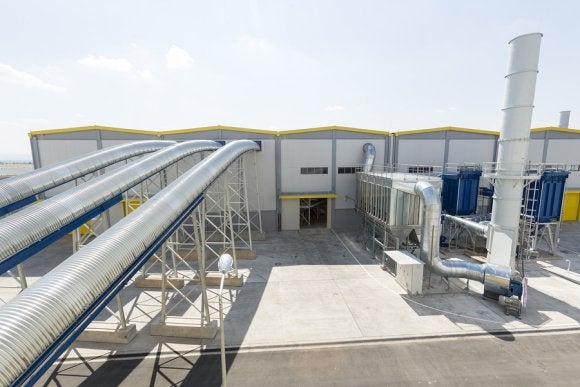
RECENT POSTS
categories
- Uncategorized
- Waste Management Atlanta
- Waste Disposal and Recycling
- Hazardous Waste Disposal
- Chemical waste removal
- solid waste removal
- R3 Program
- Sustainable Organizations
- Sustainable Waste Removal
- Commercial Waste Removal
- Materials Management Program
- Dumpster Rental
- Roll Off Dumpsters
- Construction Site Waste Removal
- Sustainability
- Recycling in Atlanta
- Industrial Recycling
- Industrial Waste Removal Services
- Southern Waste & Recycling
- Waste Removal Atlanta
- Waste Specialists
- Atlanta
- Infographic
- Front Load Dumpsters
- Rear Load Dumpsters
- Reusable Electronics
- Dump Truck Atlanta
- Recyclable Electronics
- Trash Compactors
- Recycling
- Recycling Program
- Office Recycling
- Metal Recycle
- Electronic Waste
